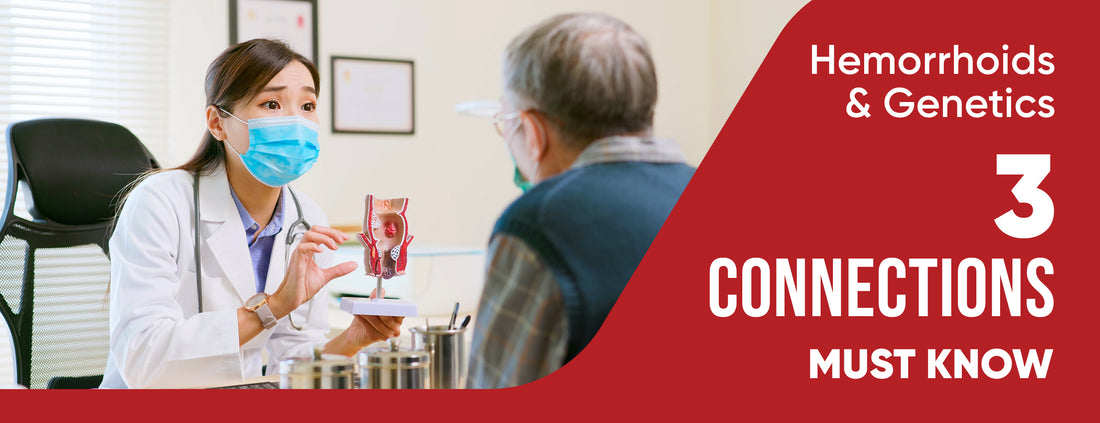Many people know the symptoms and treatments associated with hemorrhoids, but few know genetics may play a role in their development. Whether you’re currently suffering from hemorrhoid symptoms or want to prevent them in the future, understanding the possible genetic links can help guide you on a better path.
Hemorrhoids and genetics are connected, as an individual's genetic composition can predispose them to the condition. Studies reveal how family history and genetics could heighten the risk of developing hemorrhoids.
In this blog post, we’ll dive into what scientists have uncovered about the connection between genetics and hemorrhoids and ways to prevent them from developing.
Hemorrhoids and Genetics: Is There a Connection?
The Genetics Behind Hemorrhoids As we have seen in the previous section, genetics play a significant role in determining how likely a person is to develop hemorrhoids and how severe and recurrent they are.
But how exactly do genetics influence hemorrhoid development? And how can we determine if we have a genetic predisposition to hemorrhoids?
In this section, we will examine the genetics of hemorrhoids by exploring three key aspects:
- The impact of genetic predisposition on the development of hemorrhoids.
- The connection between family history and hemorrhoids.
- The findings of genetic studies that shed light on the causes of piles.
Genetic Predisposition and Its Impact on Hemorrhoid Development

Genetic predisposition is the tendency to develop conditions or diseases due to inherited genes. Genes carry instructions for making proteins, which can vary from person to person and affect the risk of certain conditions, like hemorrhoids.
Hemorrhoids are caused by increased pressure in the lower rectum and anus veins. In the large intestine, the rectum means connects the colon and anus. The body stores stool in the colon before a person has a bowel movement. The rectal area can be affected by a variety of conditions. Factors like straining during bowel movements, pregnancy, obesity, or aging can lead to such pressure. But, some are more prone due to genetic predisposition.
A genetic predisposition can affect vein elasticity, bleeding, healing, and the inflammatory response to hemorrhoid development, influencing the recurrence and severity of symptoms.
For example, some may cause veins to dilate and get damaged more easily, resulting in more severe and frequent hemorrhoids. Others may cause less frequent and milder cases. Additionally, genes can make the immune system react more or less to hemorrhoids, leading to more or less swelling and pain.
Genes can affect hemorrhoid development in different ways, depending on:
- The type and number of genes involved.
- The environmental influences and lifestyle choices that may affect gene expression or interaction.
- The presence or absence of other risk factors or protective factors for developing hemorrhoids.
A genetic predisposition does not mean that a person will develop hemorrhoids. It only means they have a higher or lower chance of developing them than someone without a genetic predisposition.
Genetic Study Findings: Shedding Light on Why People Get Piles

Another way to learn more about the genetics behind hemorrhoids is to look at the findings of genetic studies. Genetic studies are research projects that aim to identify the genes and genetic variations that are associated with specific diseases and conditions, such as hemorrhoids.
Genetic studies can help us understand how genetics influence hemorrhoid development by revealing the following:
- Genetic variation and genes involved in the process.
- The possible mechanisms or pathways by which these genes affect hemorrhoid development.
- Our genetic makeup determines risk factors and protective factors for hemorrhoids.
For example, one genetic study conducted by researchers from China found that a gene called NOS1AP significantly associated with an increased risk of developing hemorrhoids. This gene encodes a protein that interacts with nitric oxide synthase 1 (NOS1), an enzyme that produces nitric oxide (NO), a molecule that regulates blood vessel dilation and inflammation.
Variations in this gene may impact NO production or regulation in the rectal and anal veins, resulting in raised pressure and consequential damage.
According to an Italian genetic study, a gene called MMP9 is significantly associated with decreasing the risk of hemorrhoids. This gene encodes matrix metalloproteinase 9 (MMP9), an enzyme degrading extracellular matrix proteins, which are components of connective tissues such as blood vessels.
The variation of the gene increases elasticity and resilience in anal and rectal veins by affecting MMP9 expression or activation.
These are just some of the many genetic studies on hemorrhoids. Research has identified genes and genetic variations linked to an increased or decreased risk of developing hemorrhoids through large-scale analysis of individuals with and without the condition using methods like GWAS, CGS, and FS.
However, these studies also face some limitations and challenges. For instance:
- Some studies may have small sample sizes or need more replication, which may affect the validity or reliability of their findings.
- Some studies may have conflicting results or inconsistent associations, reflecting the complexity or heterogeneity of hemorrhoid development.
- Some studies may only explain a small fraction of the genetic variance or heritability of hemorrhoids, meaning many unknown genes or genetic variations still contribute to hemorrhoid development.
Therefore, more research is needed to confirm and expand on the existing findings of genetic studies on hemorrhoids. By doing so, we can gain more insight into why people get piles and how we can prevent and treat them more effectively based on our genetic factors.
Family History And Its Connection to Hemorrhoids

Check your family history for clues to your genetic risk for hemorrhoids. It records diseases and conditions in your family, providing hints about possible inheritance patterns and risk factors.
Hemorrhoids often have a familial link, with hereditary playing a significant role. If close family members like parents, siblings, grandparents, aunts, uncles, or cousins have experienced hemorrhoids, the likelihood of developing them increases. Shared genetics with our relatives can heighten the risk of hemorrhoid development.
Family history is key to hemorrhoid risk. Higher risk with more family members affected at a young age or with severe, recurrent cases. Conversely, fewer or no cases in the family lead to a lower risk.
Family history estimates our health risks, but not all genetic or environmental factors affect hemorrhoids. If you're worried about your risk, talk to a doctor.

Having A Family History Of Hemorrhoids
If we have a family history of hemorrhoids, we may face some challenges and concerns regarding our health and well-being. Our genetic predisposition to hemorrhoids may affect our likelihood of developing them and how we can prevent or treat them.
This section discusses hemorrhoids and family history. It covers identifying symptoms, early detection, and coping strategies. The first topic is recognizing signs and symptoms.
Recognizing the Signs and Symptoms of Hemorrhoids

If you have a familial history of hemorrhoids, it's important to distinguish and acknowledge the signs and symptoms associated with the condition.
Depending on size, location, and severity, hemorrhoids can cause different signs and symptoms. Some people may have no symptoms, while others may have mild or severe symptoms that interfere with their daily activities.
If hemorrhoids run in the family, monitoring anal health regularly for symptoms is crucial. We should also consult with a doctor if we notice any changes or abnormalities in our anal area, such as:
- Bleeding during or after bowel movements.
- Pain or discomfort in the anal area.
- Itching or irritation in the anal area.
- Swelling or inflammation in the anal area.
- A lump or mass near the anus.
- A feeling of incomplete evacuation after bowel movements.
- A feeling of fullness or pressure in the anal area.
Similar symptoms to hemorrhoids may indicate other conditions such as anal fissures, abscesses, infections, polyps, or cancer. It is important to seek medical attention for an accurate diagnosis and treatment.
Coping Strategies for Individuals with a Genetic Predisposition

Families with hemorrhoids face specific challenges that require effective coping mechanisms. By adopting appropriate strategies, navigating the situation can become more manageable.
These strategies are essential in managing the stressors and challenges impacting our physical and mental well-being. By implementing coping strategies, we can better navigate our emotions, thoughts, behaviors, and actions in response to these stressors or challenges.
Emotional Impact and Unhealthy Behaviors
In families with hemorrhoids, individuals may experience negative emotions such as guilt, shame, anger, and frustration due to their genetic predisposition.
Moreover, negative thoughts like "I'm inevitably prone to hemorrhoids" or "It's unjust that my genes predispose me to this condition" may arise. Additionally, engaging in unhealthy behaviors such as self-medicating with alcohol or drugs, avoiding seeking medical help, or isolating oneself from others can exacerbate the situation.
Importance of Adopting Coping Strategies
These feelings, thoughts, and behaviors can have detrimental effects on both physical and mental health, as well as interfere with daily activities and relationships. Therefore, adopting coping strategies that enable individuals to deal with these stressors or challenges positively and constructively is crucial.
Seeking Social Support

One effective coping strategy is seeking social support, which involves reaching out to others who genuinely care about our well-being. Social support can provide various forms of assistance, including emotional support, informational support, instrumental support, and appraisal support.
By seeking social support, individuals can experience reduced loneliness, isolation, or distress. It can also foster a sense of belonging, acceptance, and self-worth while enhancing knowledge, skills, and resources. Furthermore, social support can improve confidence, motivation, and overall performance.
Seeking Professional Help
A valuable way to cope is by seeking help from trained experts, including medical professionals like doctors and nurses, and mental health or legal professionals like psychologists, counselors, lawyers, or advocates. Professional help provides an accurate diagnosis, appropriate treatment, and tailored strategies, addressing underlying causes and protecting the rights of those seeking assistance.
Practicing Self-Care
Taking care of yourself is essential for coping with stress and improving overall well-being. This can involve eating a balanced diet, exercising regularly, getting good sleep, and practicing stress management techniques like deep breathing or meditation. Hobbies and pursuing meaning can also help boost mood and resilience.
Educating Ourselves

Educating ourselves about our condition and related factors empowers us to cope better. Reading, watching, listening, and attending events or courses enables us to grow our awareness, dispel myths, stay up-to-date, and discover new treatments.
Changing Our Perspective
To cope with life's challenges, changing our perspective is key. Techniques like reframing, finding humor in situations, and replacing negative thoughts with positive ones can reduce negative emotions, increase positivity, and improve our relationships and problem-solving abilities.
Personalized Coping Strategies
Coping strategies work differently for each person, so trying different ones is best to find what works for you. Getting guidance from professionals can help too.
Genetics is not the only factor that influences hemorrhoid development. Other factors such as diet, lifestyle, age, and health conditions can increase or decrease the risk of developing hemorrhoids.
These factors are called risk factors, and they can interact with genetics in complex ways to affect hemorrhoid development.
Genetics can affect hemorrhoid risk factors. We'll explore how genes impact individuals, common risks, and ways to prevent them.
The Role of Genetics in Determining Individual Risk Factors

A risk factor increases the likelihood of developing a disease or condition. Risk factors can be modifiable or non-modifiable. Individuals can change or control modifiable risk factors like diet, lifestyle, or medication use. The individual cannot change or control non-modifiable risk factors like age, sex, or family history.
Genetics can influence both modifiable and non-modifiable risk factors for developing hemorrhoids. Genetics can influence modifiable risk factors by affecting how the body responds to certain stimuli or substances, such as food, drugs, or hormones.
Example 1, Some people may have genes that make them more sensitive to spicy foods, leading to hemorrhoids. In contrast, others may be genetically resistant to the effects of fiber supplements to relieve constipation and reduce pressure on veins.
Example 2, Some people have genes that make them prone to varicose veins in their legs, affecting veins & increasing the risk of hemorrhoids. Others have genes leading to hormonal changes during pregnancy/menopause, affecting blood flow/vein elasticity in the rectum & anus.
Genetics affect individual risk factors for hemorrhoids, depending on gene type and number, environment, and lifestyle choices. Genes can interact differently with other risk factors, positively or negatively affecting hemorrhoid development.
Therefore, it is important to understand how genetics influence individual risk factors for developing hemorrhoids and how they interact with other risk factors in complex ways. By doing so, we can identify our personal risk profile and take appropriate measures to reduce our risk of developing hemorrhoids.
Common Risk Factors Influenced by Genetics

Several risk factors can cause hemorrhoids, but some are more common than others. Some of these common risk factors are also influenced by genetics in various ways.
Genetics influences some common risk factors, such as:
Constipation and Bowel Habits
Constipation can cause hemorrhoids from straining during bowel movements. Causes include a low-fiber diet, low-fluid intake, lack of exercise, medication use, or underlying health conditions. Genetics can also affect bowel habits, with some more prone to developing IBS or celiac disease.

Obesity and Weight Management
Obesity occurs when a person has excess body fat, which can impact one's health. A high-calorie diet, physical inactivity, medication use, or health conditions often cause it.
Genetics also influences how the body stores fat and regulates appetite and metabolism.
For example, some may have genes that boost the body's energy at rest, while others may have genes that reduce leptin, a hormone that signals fullness. Obesity can also cause pressure on the rectal and anal veins, leading to hemorrhoid formation.
Pregnancy and Childbirth

In pregnancy, the rectal and anal veins can be stressed and enlarged. Hormonal changes affect blood flow and vein elasticity. Childbirth can cause vein damage due to pushing or tearing. Genetics can affect how the body adapts to pregnancy and childbirth, including conditions like gestational diabetes and pelvic floor dysfunction.
Child Hemorrhoid
Hemorrhoids rarely occur in babies. They can stem from issues like constipation or chronic liver failure. Despite their typically harmless nature, it's crucial not to overlook rectal bleeding. Promptly consult your child's healthcare provider upon observing rectal bleeding or any unusual growth.
Here are some genetic factors that can influence the development of hemorrhoids. However, other risk factors can influence hemorrhoid development, such as aging, chronic coughing, heavy lifting, prolonged sitting or standing, anal intercourse, or liver disease. These risk factors may also be influenced by genetics in different ways.
Addressing Genetic Risk Factors to Prevent Hemorrhoids
Thirdly, genetics influence hemorrhoid risk factors by addressing genetic risk factors. To reduce hemorrhoid development caused by genetic risk factors, modify or control the corresponding risks influenced by genetics.
Addressing genetic risk factors can include activities such as:
- Testing: is the process of examining something for a specific purpose. It can help us identify the genetic predisposition or risk profile for hemorrhoids. It can also identify other factors, like varicose veins, that may affect the risk of hemorrhoids. Testing methods include genetic, blood, and imaging tests. This information can inform prevention and treatment plans.
- Treating: involves applying remedies or interventions to manage or cure conditions such as varicose veins, irritable bowel syndrome, celiac disease, gestational diabetes, or pelvic floor dysfunction. Such methods include medication, surgery, or therapy to reduce symptoms and complications and help improve our health.
- Preventing: Preventing hemorrhoids involves modifying our lifestyle, diet, medication, and hormone usage. For instance, we can increase fiber intake, quit smoking, lose weight, switch medication, or use natural remedies. Anal and rectal veins are relieved of pressure by preventing hemorrhoids.
These activities can help address genetic risk factors for hemorrhoids. Consult a doctor to determine your risk profile and the most appropriate activities.
Preventing And Treating Hemorrhoids Using Genetic Factors?

As discussed earlier, Genetics is crucial in determining the likelihood, severity, and recurrence of hemorrhoids.
Genetics alone does not determine hemorrhoid development. Age, health, diet, lifestyle, and other factors interact complexly to increase or decrease the risk.
In this case, we must take steps to modify or control the genetic risk factors and choose the most appropriate treatment options.
Learn how lifestyle changes can lower your genetic risk of hemorrhoids and why personalized treatment plans are important.
Lifestyle Modifications to Reduce Genetic Risk
By modifying lifestyles, hemorrhoids can be prevented and treated based on genetic factors. Lifestyle modifications are changes or adjustments to our daily habits or routines that can affect our health and well-being.
Lifestyle modifications can help us address our genetic risk factors for developing hemorrhoids by avoiding or reducing exposure to the stimuli or substances that may trigger or worsen our risk of developing hemorrhoids, such as spicy foods, gluten, drugs, or hormones.
Lifestyle modifications can also help us improve our overall health and well-being by enhancing our physical and mental fitness and resilience.
Some lifestyle modifications that can help us reduce our genetic risk for developing hemorrhoids are:
Diet And Hydration

Diet and hydration affect the risk of developing hemorrhoids by influencing bowel function and stool consistency. A healthy diet and hydration can prevent constipation and strain during bowel movements, leading to hemorrhoid formation.
To maintain a healthy diet and proper hydration, consider the following:
- Increase your fiber intake.
- Drink more fluids.
- Avoid spicy or fatty foods.
- Follow a gluten-free diet.
These simple steps can go a long way in ensuring your body receives the nourishment it needs.
Exercise and Weight Management
Regular exercise and weight management can affect our hemorrhoid risk by maintaining healthy blood flow and pressure in the anal and rectal veins. They can also help prevent obesity and varicose veins, which can otherwise contribute to hemorrhoid formation.
To maintain good health, it's important to establish a regular exercise routine and manage weight. This can include exercising regularly and losing weight as needed.
Proper Bowel Habits

Having proper bowel habits affects our hemorrhoid risk through stool consistency and frequency. This helps prevent constipation and straining during bowel movements, decreasing the risk of hemorrhoid development. A proper habit prevents diarrhea and irritation that can inflame the rectal and anal veins, causing bleeding and infection.
Healthy bowel habits comprise several key elements, such as maintaining regularity, avoiding delays or rushes, and employing appropriate hygiene standards.
Adopting lifestyle changes can lower our genetic risk of hemorrhoids. However, effectiveness varies based on preference and circumstances. Consult a doctor to assess your risk profile and choose suitable lifestyle changes.

Personalized Treatment Plans Based On Genetics
To effectively prevent and treat hemorrhoids, personalized treatment plans are key. They allow tailored interventions and optimal strategies for each individual's needs and goals.
Personalized treatment plans can include the following:
- Testing: Genetic testing can reveal our predisposition or risk for developing hemorrhoids and other related conditions. With this knowledge, we can make informed decisions about our prevention and treatment plans based on our genetic factors.

- Treating: Treating our genetic risk factors for hemorrhoids involves managing or curing conditions that affect our risk, like varicose veins or irritable bowel syndrome. Accurate diagnosis, evidence-based interventions, and addressing underlying causes help prevent and treat hemorrhoids while protecting our rights.
- Preventing: spicy foods, gluten, drugs, and hormones to reduce your risk of hemorrhoids. Prevention also improves overall well-being.
- Monitoring: Monitoring helps prevent and treat hemorrhoids by tracking symptoms, evaluating interventions, identifying changes, and adjusting plans. It may involve keeping a symptom diary, using a pain scale, taking measurements, or undergoing follow-up tests. It optimizes prevention and treatment outcomes, ensuring the quality of life and well-being.
Hemorrhoids are a common and uncomfortable condition. The genetics of these disorders play an important role in their development, but individualized treatments can help mitigate their symptoms. Consulting with a doctor is important to determine the best course of action.
Conclusion
In this blog post, we explore the genetic component of hemorrhoids and their effects on the condition's development and treatment. Genetics significantly affect a person's likelihood of developing hemorrhoids, how often they manifest, and their severity.
Addressing genetic risk factors, selecting personalized treatment plans, and considering genetic factors when choosing treatment options are effective ways to tackle hemorrhoid prevention and treatment.
Understanding the genetic component of hemorrhoids can significantly improve our quality of life while empowering people to take control of their well-being.




















